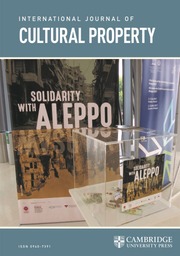No CrossRef data available.
Article contents
Portable Antiquities in the Modern European Context: Law, Ethics, Policy and Practice (Pecz, Hungary, July 12–13, 2007)
Published online by Cambridge University Press: 16 December 2008
Extract
July 12–13, 2007, the Institute of Art and Law, Leicester, invited numerous experts to an international meeting at Pecz, Hungary, about the legal and ethical issues of portable antiquities in Europe. Norman Palmer (Barrister, King's College, London) introduced the participants to the questions revolving around treasure trove and the various ways to legally structure claims for recovery of portable antiquities under both public and private law. In particular, he addressed the issue of interdependencies between potentially strong substantive law on treasure trove or protection of cultural property on the one hand and limits of implementation of such rules in cross-border cases on the other hand. Jeremy Scott (Withers LLP, London) further illustrated this issue with reference to the most recent English cases of Iran v. Berend—no renvoi in English choice of law on moveable property and (if there were renvoi) no lex originis under French choice of law—and Iran v. Barakat—no application of foreign public law such as Iranian patrimony law by English courts. In the meantime the latter case has been reversed on appeal. Kurt Siehr (Max-Planck-Institute for Private International and Foreign Law, Hamburg) outlined the mechanisms offered by community law, in particular under Directive 93/7/EEC, for the protection of cultural property of member states vis-à-vis other member states. Zsolt Visy (Pecz University) demonstrated the typical difficulties of the protection of archaeological objects found in the ground but illegally exported with reference to the highly problematic history of the Sevso Treasure. Visy also underlined the fact that most legal remedies depend on the precise attribution of the moveable object in question to a certain state. In the following a tour de raison was offered through various national legal systems on how treasure trove is regulated and to what extent claims for recovery of antiquities can be raised. Weller pointed to the peculiarity under German law that the rules on treasure trove are rather unsophisticated compared to the voluminous statutory regimes in other states and that the competency to rule on treasure trove primarily lies with the states of the Federal Republic of Germany—a situation that necessarily results in a variety of solutions. Although many rules of general nature supplement the regime of treasure trove under German law, the law on treasure trove appeared to be a suitable object for unification on the federal level, and on this occasion the protection of archaeological objects found in the ground should be strengthened. In the second part of the meeting, Guido Carducci (UNESCO, Paris) presented a comparison between the regimes of claims for recovery of antiquities under the 1970 UNESCO Convention and the 1995 UNIDROIT Convention. Patty Gerstenblith (DePaul University, United States) commented on the interaction between foreign patrimony law and domestic criminal prosecution under the National Stolen Property Act with reference to the famous case in US v. Schultz. In the following round table talk with Kurt Siehr, Jeremy Scott, and Weller, the crucial issue of the application of foreign public law such as patrimony law was discussed from a comparative perspective; and Weller drew the attention to the 1975 Wiesbaden Resolution on the Application of Foreign Public Law of the Institute of International Law, by which the world leading conflicts scholars of the time had already agreed on the principle that there was no good reason a priori to exclude foreign public law from its application by a domestic court. Further presentations on the relevance of soft law, codes of ethics, and practical issues of archaeological excavations provided a comprehensive picture of the legal and ethical issues of portable antiquities in Europe.
- Type
- Conference Reports
- Information
- Copyright
- Copyright © International Cultural Property Society 2008


